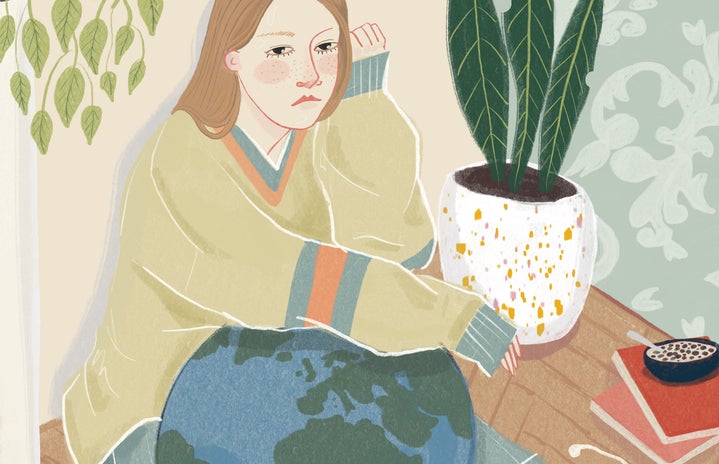Let’s not pretend that parenting wasn’t a patriarchal, heteronormative obligation that dates back thousands of years. Only recently have people rebelled against the notion of parenthood. Nowadays, we’re more self-aware, open-minded, and cognizant of the true consequences of taking on parenting a child. The current fight for abortion rights asserts the notion that the long-term consequences of becoming a parent are not completely cleared up.
That being said, we’re not here to talk about babies and new parents. The matter at hand here are young adults and old parents. The dream of moving out at eighteen has been a delusion for most of us. The economy has left us at the mercy of our benevolent parents. Surely, we should be lucky and praise their kindness…right?
I often wonder if the cost of dependence is my own soul. If you think that’s dramatic, remember that many of us are queer, neurodivergent, mentally ill or simply more open-minded. Parents are commonly thought of as representing comfort, but the secret is that sometimes said “comfort” can be shrouded by mental illness.
Restlessness. Making choices. Career and educational decisions. Your parents care about you, so they want to know what you do. They ask how many credits you have left. They ask you what you want to do after you graduate, when all you want to do is just not focus on that for a minute because you will die of stress. But the pressure of it just keeps building up on the back of your neck.
So your parents are wrapping their heads around the idea that you’re depressed, and that you have been avoiding the other diagnoses because they don’t understand them. Or perhaps they do understand, but they resent you for ‘making excuses . Or maybe they don’t do any of these things, , but they don’t listen to you the way your friends do.
One of the most empathetic sentences Lindsay C.Gibson, PsyD would write in her bestseller, Adult Children of Emotionally Immature Parents, is “…parents were once children themselves, and as children, they may have had to shut down many of their deepest feelings in order to be acceptable to their own parents”. Her book is a gem among thousands of self-help books dealing with the healing of the inner child, past trauma, and emotional blockages that occur as a result of childhood trauma.
Throughout her book, Gibson explores a variety of concepts that accurately describe this phenomenon. Father Wound, Mother Wound, Neglect Wound, Abandonment Wound— so many names, layers, and definitions that would strike you in the heart. After sitting down and reading about them, chances are you won’t be able to look at your parents the same way again.
Perhaps, at some point, one (or both) of them hurt you. You keep quiet for a long time, until the day comes when the anger and the sadness break free, but they just tell you: “Get over it” or “I don’t hold onto the past”;the second of which is the classic excuse of avoiding responsibility, because it’s demanding you’re the one who needs to forget.
Parents seem to be the wielders of your fate, influencing your attachment style, your habits, your diet, your point of view, and so many factions of yourself that it becomes metaphorically parasitic.
Except, you can break free. You don’t need to move out or even tell your parents. The only person you need to agree with is yourself. Maybe you can confide in friends that understand; or, better yet, an understanding therapist that makes you feel comfortable in expressing yourself and your struggles.
Gibson’s book gives another excellent quote:
“Emotional distress is a signal that it’s getting harder to remain emotionally unconscious. It means we’re about to discover our true selves underneath all that story business. Your true self wants you to see what’s really going on. It tries to wake you up because it wants you to stop believing that your…parents knew what was best for you and that creating a role-self is better than being who you really are. It knows better than to let a fantasy run your life.”
This is the method of detachment: freeing your mind from the metaphorical parent that is watching you force judgment. Must I remind you that this is not your actual parent?As much as they want (or don’t want) to help you, the hard truth is that they can’t. Only you can do this. You may receive their support, aid, or advice, but it is you who ultimately bears the responsibility of looking after and taking care of yourself.
“It is worse to stay where one does not belong at all than to wander about lost for a while and looking for the psychic and soulful kinship one requires”
― Clarissa Pinkola Estés, Women Who Run With the Wolves
Your mind must become independent. Your parents don’t agree with an idea you have? Well, that’s too bad, because you’re actually capable of making this idea come to life if you want it enough. You think (or know) that your parents will try to stop you? Just don’t tell them. At least, not until it’s too late to be stopped. Will your grandmother disagree with your partner? You have one of two choices: either you stand up to her or step away and hide.
Either way, you have the option of living in a way that resonates with your beliefs, aspirations and desires. You don’t have to wait until you have enough money in your pockets to rent an apartment for two months. You don’t have to wait for your parents to die. You don’t have to take extra courses in the semester so you can graduate faster and leave (unless you really want to). You don’t have to destroy your relationships with your parents.
Your mind is a universe, and you are its deity. It’s hidden away. Your mouth and fingers are the only ones that can snitch, so please use them wisely and practice your own independence as soon as you have the chance. When will you succeed? As owner of your future, it’s up to you to decide.

